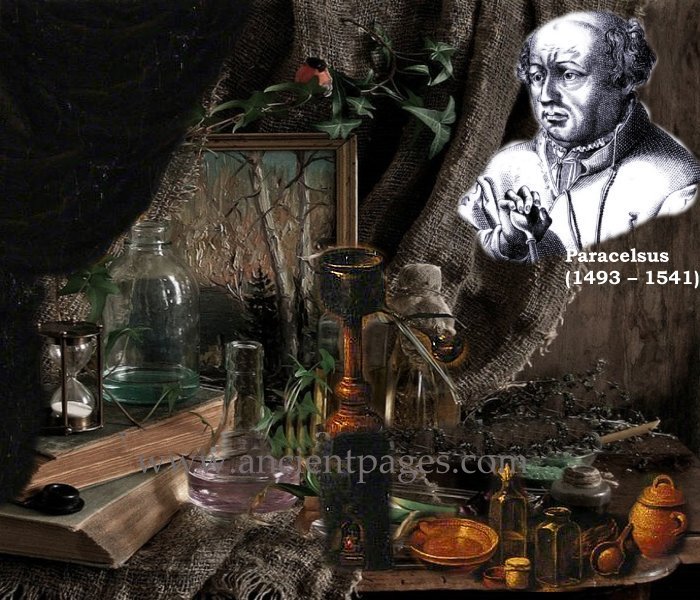Paracelsus: Physician, Alchemist, Philosopher Well Ahead Of His Time
A. Sutherland - AncientPages.com - Paracelsus (1493 - 1541) - was a Swiss-German botanist, philosopher, astrologer, alchemist, and one of the most influential medical scientists in early modern Europe.
His real name was Philippus Aureolus Theophrastus Paracelsus Bombastus von Hohenheim but he was celebrated as "Paracelsus."
His career differed radically from many of his colleagues.
At sixteen years of age, Paracelsus was already well acquainted with alchemical knowledge. After spending some time at the University of Basle, he led a wandering life, traveled throughout Europe, even visiting Arabia, Egypt, Russia, Finland, and the Arctic region, dispensing powerful wisdom centuries ahead of his time.
"Poison is in everything, and nothing is without poison. The dosage makes it either a poison or a remedy. Paracelsus
Working in the mines of Sigismund Fugger, he acquired valuable knowledge of metals and ores; he also studied diseases of his fellow-workers. Paracelsus had many talents and was gifted by nature. He believed that Nature was the best healer and that the best results could be achieved by natural methods.
Driven by invincible life energy and despite his unhealthy way of life, Paracelsus wrote over ten thousand pages devoted to surgery, alchemy, astrology, and theology.
Due to constant conflicts with his employers and even colleagues, he had not so often any permanent job.
"They drove me out of Lithuania, and Prussia, and Poland…The Dutch did not like me either, nor the schools… but thank God, the patients liked me!”
He was a visionary who considered chemistry the key to the whole universe where God was the divine alchemist who created the world.
This highly controversial scientist had a great knowledge of alchemy, surgery, and medicine and was strongly against superstitions and misconceptions and all authorities.
Paracelsus was a symbol-figure who stood for heroism, but he was also considered a charlatan. Traditionally working doctors accidentally killed dozens of his patients, according to Paracelsus, through their old-fashioned and dangerous treatment of the so-called blood-letting, a practice that Paracelsus firmly opposed.
The art of healing comes from nature, not from the physician. Therefore the physician must start from nature, with an open mind. Paracelsus
In one of his most polemical writings, a book from 1531 with the intriguing title "Paragranum" (Beyond The Seed) Paracelsus states that all physicians who follow Claudius Galenus (AD 129 – 199/217) teachings should be burned at the stake, exposed to cholera infection, drowned in mud or tormented by mosquitoes.
He made claims to manufacture potable gold granting prolonged youth and his claims may have been symbolic for the esoteric doctrine of a Universal Medicine based upon Light - the creative agent, the vibrations of which constitute the movement and life of all things. He deeply believed that medicine is supported by four pillars - philosophy, astronomy, alchemy, and ethics.
Paracelsus was one of the first physicians who gave special importance to using chemicals, minerals in medical treatment as well as opiates as anesthetics in surgery. Paracelsus's works greatly influenced the early Rosicrucians and some of his impressive ideas are startling even today.
Written by – A. Sutherland AncientPages.com Staff Writer
Copyright © AncientPages.com All rights reserved. This material may not be published, broadcast, rewritten or redistributed in whole or part without the express written permission of AncientPages.com
Expand for referencesMore From Ancient Pages
-
 Oldest Canoe Ever Discovered In Maine – It Dates To 1280-1380 A.D
Archaeology | Jun 13, 2019
Oldest Canoe Ever Discovered In Maine – It Dates To 1280-1380 A.D
Archaeology | Jun 13, 2019 -
 Tool Patterns Reveal What Caused The Neanderthals’ Extinction In The Iberian Peninsula
Archaeology | Mar 30, 2022
Tool Patterns Reveal What Caused The Neanderthals’ Extinction In The Iberian Peninsula
Archaeology | Mar 30, 2022 -
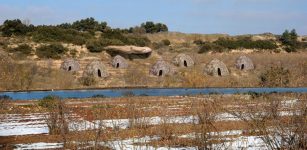 13,000-Year-Old Engraving May Depict First Paleolithic Social Group Of Humans
Archaeology | Dec 4, 2015
13,000-Year-Old Engraving May Depict First Paleolithic Social Group Of Humans
Archaeology | Dec 4, 2015 -
 Beautiful Legend Of The Christmas Rose – A Symbol Of Love And Hope
Christmas Traditions | Dec 26, 2024
Beautiful Legend Of The Christmas Rose – A Symbol Of Love And Hope
Christmas Traditions | Dec 26, 2024 -
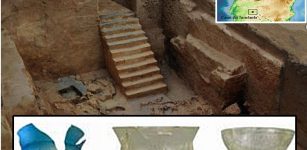 Archaeologists Highlight The Tartessos Culture’s Sustainable Construction Skills
Archaeology | Oct 4, 2024
Archaeologists Highlight The Tartessos Culture’s Sustainable Construction Skills
Archaeology | Oct 4, 2024 -
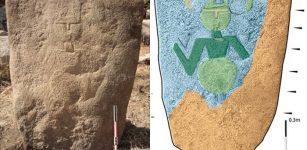 Unique Balchiria Stelae Engraved With A Goat-Like Figure Found On Corsica Is A Puzzle
Featured Stories | Feb 3, 2020
Unique Balchiria Stelae Engraved With A Goat-Like Figure Found On Corsica Is A Puzzle
Featured Stories | Feb 3, 2020 -
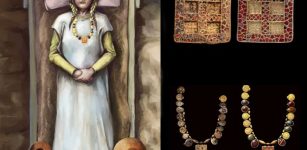 Mystery Of The Anglo-Saxon Harpole Burial Continues – New Clues
Archaeology | Dec 14, 2023
Mystery Of The Anglo-Saxon Harpole Burial Continues – New Clues
Archaeology | Dec 14, 2023 -
 Lemminkainen: Mythical War-Hero Of Finnish Great Epic ‘Kalevala’
Featured Stories | Oct 14, 2016
Lemminkainen: Mythical War-Hero Of Finnish Great Epic ‘Kalevala’
Featured Stories | Oct 14, 2016 -
 Ancient Underground Tombs And Lightening God In Peru – Complex Concepts Of Death And Renewal Revealed
Archaeology | May 22, 2018
Ancient Underground Tombs And Lightening God In Peru – Complex Concepts Of Death And Renewal Revealed
Archaeology | May 22, 2018 -
 First Genetic Map Of People Of Ireland Is Presented By Irish, British And American Researchers
Archaeology | Dec 15, 2017
First Genetic Map Of People Of Ireland Is Presented By Irish, British And American Researchers
Archaeology | Dec 15, 2017 -
 Burnt Food Remains In Neolithic Cooking Pot Sheds Light On 5,000-Year-Old Food Preparation
Archaeology | Jan 23, 2024
Burnt Food Remains In Neolithic Cooking Pot Sheds Light On 5,000-Year-Old Food Preparation
Archaeology | Jan 23, 2024 -
 Vercingetorix: Greatest Of All Gallic Leaders And Hero Of The French People
Featured Stories | Jun 24, 2020
Vercingetorix: Greatest Of All Gallic Leaders And Hero Of The French People
Featured Stories | Jun 24, 2020 -
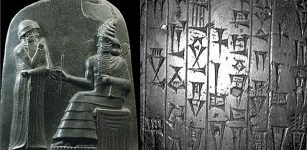 Hammurabi: The Great King Of Babylon And His Laws
Civilizations | Oct 21, 2016
Hammurabi: The Great King Of Babylon And His Laws
Civilizations | Oct 21, 2016 -
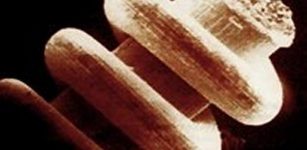 Prehistoric Hi-Tech Nanospirals Barely Visible To The Naked Eye: Still Remain An Unsolved Mystery
Ancient Technology | Mar 4, 2014
Prehistoric Hi-Tech Nanospirals Barely Visible To The Naked Eye: Still Remain An Unsolved Mystery
Ancient Technology | Mar 4, 2014 -
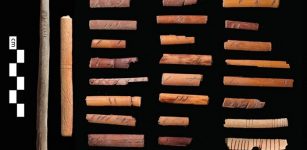 America’s First Casino Was Created By The Promontory Culture 700 Years Ago
Ancient History Facts | Apr 30, 2016
America’s First Casino Was Created By The Promontory Culture 700 Years Ago
Ancient History Facts | Apr 30, 2016 -
 Leonardo Da Vinci’s Mother Might Have Been A Slave – Here’s What The Discovery Reveals About Renaissance Europe
Featured Stories | Mar 30, 2023
Leonardo Da Vinci’s Mother Might Have Been A Slave – Here’s What The Discovery Reveals About Renaissance Europe
Featured Stories | Mar 30, 2023 -
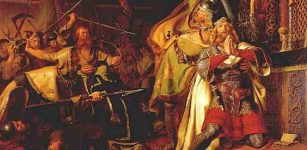 Thousand-Year-Old Sarcophagus Discovered In Odense
News | Sep 28, 2015
Thousand-Year-Old Sarcophagus Discovered In Odense
News | Sep 28, 2015 -
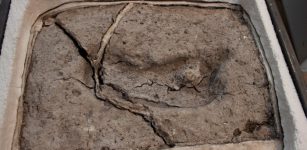 Discovery Of Oldest Human Footprint In The Americas Can Re-Write History
Archaeology | Apr 30, 2019
Discovery Of Oldest Human Footprint In The Americas Can Re-Write History
Archaeology | Apr 30, 2019 -
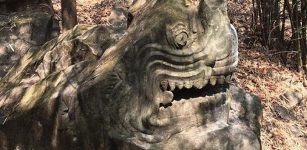 Ancient Statue Of Makara, Legendary Sea-Creature Found In Cambodia
Archaeology | Jan 29, 2020
Ancient Statue Of Makara, Legendary Sea-Creature Found In Cambodia
Archaeology | Jan 29, 2020 -
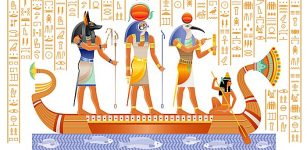 Never-Ending Battles Between God Ra And Indestructible Apophis In Ancient Egyptian Beliefs
Egyptian Mythology | May 20, 2021
Never-Ending Battles Between God Ra And Indestructible Apophis In Ancient Egyptian Beliefs
Egyptian Mythology | May 20, 2021

